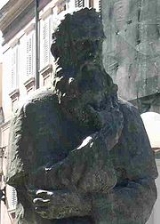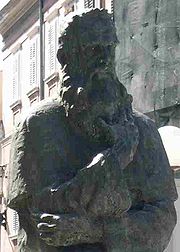
Pier Paolo Vergerio
Encyclopedia

Life
He was born at Capodistria (Koper), then part of the Venetian Republic and studied jurisprudence in PaduaPadua
Padua is a city and comune in the Veneto, northern Italy. It is the capital of the province of Padua and the economic and communications hub of the area. Padua's population is 212,500 . The city is sometimes included, with Venice and Treviso, in the Padua-Treviso-Venice Metropolitan Area, having...
, where he delivered lectures in 1522. He also practiced law in Verona
Verona
Verona ; German Bern, Dietrichsbern or Welschbern) is a city in the Veneto, northern Italy, with approx. 265,000 inhabitants and one of the seven chef-lieus of the region. It is the second largest city municipality in the region and the third of North-Eastern Italy. The metropolitan area of Verona...
, Padua, and Venice
Venice
Venice is a city in northern Italy which is renowned for the beauty of its setting, its architecture and its artworks. It is the capital of the Veneto region...
. In 1526, he married Diana Contarini, whose early death was at least a partial cause of his entering upon an ecclesiastical career.
Papal nuncio
His advancement was so rapid that as early as 1533 he was papal nuncioNuncio
Nuncio is an ecclesiastical diplomatic title, derived from the ancient Latin word, Nuntius, meaning "envoy." This article addresses this title as well as derived similar titles, all within the structure of the Roman Catholic Church...
to King Ferdinand
Ferdinand I, Holy Roman Emperor
Ferdinand I was Holy Roman Emperor from 1558 and king of Bohemia and Hungary from 1526 until his death. Before his accession, he ruled the Austrian hereditary lands of the Habsburgs in the name of his elder brother, Charles V, Holy Roman Emperor.The key events during his reign were the contest...
in Germany
Germany
Germany , officially the Federal Republic of Germany , is a federal parliamentary republic in Europe. The country consists of 16 states while the capital and largest city is Berlin. Germany covers an area of 357,021 km2 and has a largely temperate seasonal climate...
, and he was there again in 1535 on business connected with the council. The nuncio's eagerness in the cause of the council brought him into a personal encounter with Martin Luther
Martin Luther
Martin Luther was a German priest, professor of theology and iconic figure of the Protestant Reformation. He strongly disputed the claim that freedom from God's punishment for sin could be purchased with money. He confronted indulgence salesman Johann Tetzel with his Ninety-Five Theses in 1517...
at Wittenberg
Wittenberg
Wittenberg, officially Lutherstadt Wittenberg, is a city in Germany in the Bundesland Saxony-Anhalt, on the river Elbe. It has a population of about 50,000....
.
Although Vergerio achieved little in the way of his appointed task, which was to induce the protestants to send delegates to the council, Pope Paul III
Pope Paul III
Pope Paul III , born Alessandro Farnese, was Pope of the Roman Catholic Church from 1534 to his death in 1549. He came to the papal throne in an era following the sack of Rome in 1527 and rife with uncertainties in the Catholic Church following the Protestant Reformation...
twice dispatched him across the Alps; and meanwhile rewarded him, first with the bishopric of Modruš
Modruš
Modruš is a village in the mountainous part of Croatia, located south of Josipdol. The population is 197 .This now small village is historically noted as the seat of one of the medieval Catholic bishoprics, established in 1185 in Krbava and moved to Modruš in the 1460s. It later became the Roman...
in Croatia
Croatia
Croatia , officially the Republic of Croatia , is a unitary democratic parliamentary republic in Europe at the crossroads of the Mitteleuropa, the Balkans, and the Mediterranean. Its capital and largest city is Zagreb. The country is divided into 20 counties and the city of Zagreb. Croatia covers ...
, and in the year 1536 with the bishopric of Capodistria. In the year 1540, Vergerio again entered active diplomatic service; he was at Worms
Worms, Germany
Worms is a city in Rhineland-Palatinate, Germany, on the Rhine River. At the end of 2004, it had 85,829 inhabitants.Established by the Celts, who called it Borbetomagus, Worms today remains embattled with the cities Trier and Cologne over the title of "Oldest City in Germany." Worms is the only...
at the religious conference as commissioner for King Francis I of France
Francis I of France
Francis I was King of France from 1515 until his death. During his reign, huge cultural changes took place in France and he has been called France's original Renaissance monarch...
. It was in memory of the council that he dedicated the tract De unitate et pace ecclesiae. Like Cardinal Contarini, beside whom he also appeared at the religious conference of Regensburg
Conference of Regensburg
The Colloquy of Regensburg, historically called the Colloquy of Ratisbon, was a conference held at Regensburg in 1541, during the Protestant Reformation, which marks the culmination of attempts to restore religious unity in the Holy Roman Empire by means of theological debate.-Background:Delegates...
in 1541, he was charged with having conceded too much to the protestants. He then resolved to return to Capodistria and pursue thorough studies.
Vergerio had yet no thought of withdrawing from the Roman Catholic Church
Roman Catholic Church
The Catholic Church, also known as the Roman Catholic Church, is the world's largest Christian church, with over a billion members. Led by the Pope, it defines its mission as spreading the gospel of Jesus Christ, administering the sacraments and exercising charity...
, nor did he overstep the line of reformatory attempts within that church, such as were espoused by Contarini and others. But suspicion was awakened such that on December 13, 1544, a denunciation of Vergerio was lodged with the Venetian Inquisition
Inquisition
The Inquisition, Inquisitio Haereticae Pravitatis , was the "fight against heretics" by several institutions within the justice-system of the Roman Catholic Church. It started in the 12th century, with the introduction of torture in the persecution of heresy...
. Although, after due examination, Vergerio was released, Cardinal Marcello Cervini
Pope Marcellus II
Pope Marcellus II , born Marcello Cervini degli Spannochi, was Pope from 9 April 1555 to 1 May 1555, succeeding Pope Julius III. Before his accession as Pope he had been Cardinal-Priest of Santa Croce in Gerusalemme. He is the most recent Pope to choose to retain his birth name as his regnal name...
, then Pope Marcellus II, took advantage of the fact that Vergerio was not yet formally absolved to prevent his participation in the council for which he had labored so many years.
Vergerio had to return from Riva and began a publishing activity which turned more and more against the Roman Catholic Church. In connection with the Historic of Francesco Spiera
Francesco Spiera
Francesco Spiera was a Protestant Italian jurist. The manner of his death was the subject of numerous religious tracts.-Life:He was born at Cittadella, 20 km north of Padua, then part of the Republic of Venice...
of December 7, 1549, Vergerio directed a sharp reply to the bishop of Padua.
Exile
Instead of responding to a second summons by the Nuncio Della Casa to appear before the tribunal in Venice, on May 1, 1549, he left Italy forever. The experiences at Spiera's sick-bed had brought Vergerio to a decision. The twelve treatises which he produced at BaselBasel
Basel or Basle In the national languages of Switzerland the city is also known as Bâle , Basilea and Basilea is Switzerland's third most populous city with about 166,000 inhabitants. Located where the Swiss, French and German borders meet, Basel also has suburbs in France and Germany...
in 1550 supply information regarding his position. Meanwhile, the second trial had been conducted in Venice in absentio and was confirmed at Rome
Rome
Rome is the capital of Italy and the country's largest and most populated city and comune, with over 2.7 million residents in . The city is located in the central-western portion of the Italian Peninsula, on the Tiber River within the Lazio region of Italy.Rome's history spans two and a half...
, July 3, 1549. Vergerio was convicted of heresy in 34 points, deposed from his episcopal dignity, and made subject to arrest.
At that time, however, he was in the Swiss Grisons, and became active in a brisk round of polemics. His themes were the papacy, its origin and policy; the jubilees; saint and relic worship, and the like. Vergerio continued in the Grisons till 1553, when he heeded a call from Duke Christopher
Christoph, Duke of Württemberg
Christoph of Württemberg, Duke of Württemberg ruled as Duke of Württemberg from 1550 until his death in 1568....
of Württemberg
Württemberg
Württemberg , formerly known as Wirtemberg or Wurtemberg, is an area and a former state in southwestern Germany, including parts of the regions Swabia and Franconia....
to write and travel on behalf of Evangelical doctrine. While he never again set foot in Italy, in 1556 he made his way to Poland
Poland
Poland , officially the Republic of Poland , is a country in Central Europe bordered by Germany to the west; the Czech Republic and Slovakia to the south; Ukraine, Belarus and Lithuania to the east; and the Baltic Sea and Kaliningrad Oblast, a Russian exclave, to the north...
, and conferred with Duke Albrecht of Prussia
Prussia
Prussia was a German kingdom and historic state originating out of the Duchy of Prussia and the Margraviate of Brandenburg. For centuries, the House of Hohenzollern ruled Prussia, successfully expanding its size by way of an unusually well-organized and effective army. Prussia shaped the history...
. He was in Poland in 1559 with the two-fold object of meeting the moves of the Nuncio Alois Lipomano, and of working counter to Johannes a Lasco. He sought permission to take part in the religious conference at Poissy
Poissy
Poissy is a commune in the Yvelines department in the Île-de-France in north-central France. It is located in the western suburbs of Paris from the center.In 1561 it was the site of a fruitless Catholic-Huguenot conference, the Colloquy at Poissy...
in 1560, but he was not allowed to appear at the Council of Trent
Council of Trent
The Council of Trent was the 16th-century Ecumenical Council of the Roman Catholic Church. It is considered to be one of the Church's most important councils. It convened in Trent between December 13, 1545, and December 4, 1563 in twenty-five sessions for three periods...
as the duke's delegate. During all these years he continued his polemical authorship and worked toward the publication of his Opera, though only the first volume appeared (1563). He died at Tübingen
Tübingen
Tübingen is a traditional university town in central Baden-Württemberg, Germany. It is situated south of the state capital, Stuttgart, on a ridge between the Neckar and Ammer rivers.-Geography:...
.

